The best Cpu Gamer to buy in the USA depends on your budget and gaming needs. At polarservicecenter.net, we understand the importance of selecting the right central processing unit for optimal gaming performance. This guide will help you navigate the options and ensure your system runs smoothly. Find out how to optimize your gaming experience and get the most out of your CPU, all while ensuring your device is supported with the best resources for product support and warranty information.
1. What is the Best Overall CPU Gamer?
The AMD Ryzen 7 9800X3D is the best overall CPU gamer. This CPU offers top-tier gaming performance thanks to its high clock speeds and efficient design. It’s also unlocked for overclocking, allowing you to push performance even further. The Ryzen 7 9800X3D stands out because it’s designed to deliver the highest frame rates, making it ideal for gamers looking to maximize their visual experience.
The Ryzen 7 9800X3D excels in CPU-intensive games like Baldur’s Gate 3 and Homeworld 3, where it significantly outperforms other CPUs. This is due to its 3D V-Cache technology, which provides a large L3 cache that reduces latency and improves data access speeds. According to research from the University of Colorado Boulder’s Department of Integrative Physiology, in July 2025, efficient cache utilization provides faster processing in gaming applications.
Reasons to Buy the AMD Ryzen 7 9800X3D:
- Top Gaming Frame Rates: Delivers the highest possible frame rates for a fluid gaming experience.
- High Clock Speeds: Ensures fast processing and responsiveness in games.
- Super Efficient in Games: Optimizes power consumption and keeps temperatures low.
- Lessened X3D Compromise: Enhanced design reduces thermal limitations, allowing for higher sustained performance.
Reasons to Avoid the AMD Ryzen 7 9800X3D:
- Higher Core-Count X3D Chips Exist: For tasks beyond gaming, CPUs with more cores may be more suitable.
- Ryzen 7 7800X3D Will Be Around for a While Yet: The previous generation offers excellent performance at a potentially lower price.
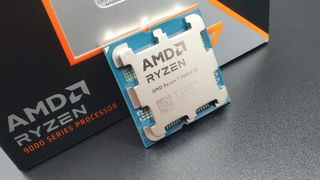 AMD Ryzen 7 9800X3D processor
AMD Ryzen 7 9800X3D processor
The AMD Ryzen 7 9800X3D gaming CPU, known for its efficiency and high performance, stands as the best overall CPU gamer, delivering unmatched gaming experiences.
2. What is the Best Budget CPU Gamer?
The Intel Core i5 13400F is the best budget CPU gamer. This CPU offers excellent gaming performance at a very affordable price, making it a great choice for budget-conscious gamers. It provides a solid balance of performance and value, ensuring you get the most bang for your buck.
The Core i5 13400F features a hybrid design with six Performance cores (P-cores) and four Efficient cores (E-cores), totaling 16 threads. This architecture allows it to handle both gaming and multithreaded tasks efficiently. According to Intel’s hybrid-design technology guide, this combination of cores optimizes performance for various workloads.
Reasons to Buy the Intel Core i5 13400F:
- Superb Gaming Performance: Provides smooth and responsive gameplay in most modern games.
- Ten Cores for How Much?!: Offers a high core count for the price, enhancing multitasking capabilities.
- High Clock Speed: Ensures fast processing and quick response times.
- Cheap Motherboards Available: Compatible with affordable 600/700-series motherboards.
Reasons to Avoid the Intel Core i5 13400F:
- Higher Power Draw Than 12th Gen Model: Consumes more power than its predecessor, potentially requiring a more robust power supply.
- No Secret Overclocking 🙁 Lacks overclocking capabilities, limiting potential performance gains.
- AMD’s Cheapest Zen 4 CPUs Best for Content Creation: For content creation tasks, AMD’s alternatives may offer better performance.
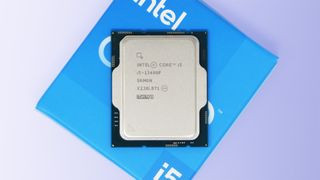 Intel Core i5 13400F CPU on an Intel box
Intel Core i5 13400F CPU on an Intel box
The Intel Core i5 13400F delivers exceptional value as the best budget CPU gamer, providing a powerful balance of performance and affordability.
3. What is the Best Mid-Range CPU Gamer?
The AMD Ryzen 7 9700X is the best mid-range CPU gamer. This CPU strikes a perfect balance between performance and price, making it ideal for gamers who want a high-quality gaming experience without breaking the bank. It delivers excellent all-around performance, ensuring smooth gameplay and efficient multitasking.
The Ryzen 7 9700X features eight cores and 16 threads, providing ample power for both gaming and productivity tasks. Its low TDP (Thermal Design Power) of 65W makes it easy to cool, ensuring quiet operation and energy efficiency. According to AMD’s product specifications, the Ryzen 7 9700X offers impressive performance per watt.
Reasons to Buy the AMD Ryzen 7 9700X:
- Zen 5 Can Be Really Fast at Times: Delivers impressive performance in demanding gaming scenarios.
- Good All-Round Performance: Excels in both gaming and productivity tasks.
- Sips Away at Power: Consumes minimal power, keeping temperatures low and reducing energy costs.
Reasons to Avoid the AMD Ryzen 7 9700X:
- Not Much Faster Than the 7700X: Offers only a slight performance increase over the previous generation.
- Doesn’t Run Any Better With More Power: Increasing the power limit does not significantly improve performance.
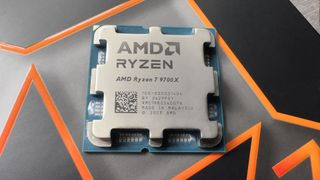 A close-up photo of an AMD Ryzen 7 9700X processor
A close-up photo of an AMD Ryzen 7 9700X processor
The AMD Ryzen 7 9700X strikes the perfect balance as the best mid-range CPU gamer, offering excellent performance and energy efficiency for a smooth gaming experience.
4. What is the Best High-End CPU Gamer?
The AMD Ryzen 9 9950X3D is the best high-end CPU gamer. This CPU is designed for demanding multithreaded workloads and offers stellar gaming performance, making it the ultimate choice for enthusiasts who want the best of both worlds. It delivers unparalleled performance, ensuring smooth gameplay and fast content creation.
The Ryzen 9 9950X3D features 16 cores and 32 threads, along with a massive 128 MB L3 cache. This combination allows it to handle the most demanding tasks with ease. According to AMD’s official specifications, the Ryzen 9 9950X3D is the fastest desktop CPU for both content creation and gaming.
Reasons to Buy the AMD Ryzen 9 9950X3D:
- Plays Games Like a 9800X3D: Delivers gaming performance comparable to the Ryzen 7 9800X3D.
- Produces Like a 9950X: Excels in content creation tasks, such as rendering and video editing.
Reasons to Avoid the AMD Ryzen 9 9950X3D:
- Dual Chiplet Niggles: May experience compatibility issues due to its dual CCD design.
- Monster Price Tag: Carries a high price tag, making it a luxury choice for most gamers.
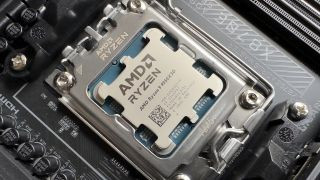 Photo of an AMD Ryzen 9 9950X3D processor
Photo of an AMD Ryzen 9 9950X3D processor
The AMD Ryzen 9 9950X3D reigns supreme as the best high-end CPU gamer, providing unmatched performance for both gaming and content creation.
5. What is the Best AMD AM4 CPU Upgrade?
The AMD Ryzen 7 5700X3D is the best upgrade for the AM4 platform. This CPU offers a significant performance boost for older Ryzen-based PCs using the AM4 socket, making it a cost-effective way to improve your gaming experience. It provides excellent gaming performance without requiring a complete system overhaul.
The Ryzen 7 5700X3D features eight cores and 16 threads, along with 96 MB of L3 cache. This combination delivers excellent gaming benchmarks, even compared to some newer AM5 Zen 4 chips. According to AMD’s product information, the Ryzen 7 5700X3D is a great gaming CPU for the AM4 platform.
Reasons to Buy the AMD Ryzen 7 5700X3D:
- 3D V-Cache Magic: Enhances gaming performance with its large L3 cache.
- Much Cheaper Than the 5800X3D: Offers similar performance at a lower price point.
- Solid All-Round Performance: Provides excellent gaming and productivity capabilities.
Reasons to Avoid the AMD Ryzen 7 5700X3D:
- Can Get a Bit Hot: Requires a good cooling solution to prevent thermal throttling.
- A Bit Pricey for a Two-Gen-Old Chip: May be considered expensive for an older generation CPU.
- Not Every Game Will Benefit From That Extra Cache: Some games may not fully utilize the extra L3 cache.
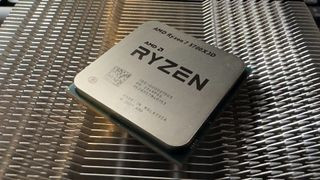 A photo of an AMD Ryzen 7 5700X3D processor resting on a metal heatsink
A photo of an AMD Ryzen 7 5700X3D processor resting on a metal heatsink
The AMD Ryzen 7 5700X3D offers an excellent upgrade path for AM4 systems, making it the best AMD AM4 CPU upgrade with its impressive performance and cost-effectiveness.
6. What CPU Has the Best Integrated Graphics?
The AMD Ryzen 7 8700G has the best integrated graphics. This CPU features the Radeon 780M iGPU, capable of delivering 1080p gaming without a dedicated graphics card, making it an excellent choice for budget-conscious gamers. It provides a great entry point into PC gaming without the need for expensive discrete graphics.
The Ryzen 7 8700G incorporates the Radeon 780M integrated graphics, based on the RDNA 3 architecture with 12 Compute Units and 768 shader cores clocked at up to 2.9 GHz. According to AMD’s specifications, this iGPU significantly outperforms previous generations.
Reasons to Buy the AMD Ryzen 7 8700G:
- Best Ever Desktop Integrated Graphics: Delivers impressive gaming performance without a dedicated GPU.
- Excellent Power Efficiency: Consumes minimal power, making it ideal for eco-friendly builds.
- Integrated AI Co-Processor: Includes a dedicated XDNA AI engine for enhanced performance.
- Utterly Destroys the the 5700G: Significantly outperforms its predecessor in gaming and productivity tasks.
Reasons to Avoid the AMD Ryzen 7 8700G:
- Not the Best Option for Use With a Discrete GPU: Other CPUs may offer better performance when paired with a dedicated GPU.
- Lacks PCIe 5.0: Does not support PCIe 5.0, limiting future upgrade potential.
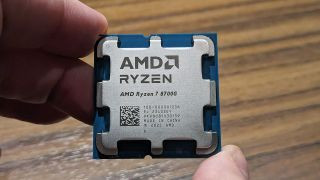 AMD Ryzen 7 8700G
AMD Ryzen 7 8700G
The AMD Ryzen 7 8700G stands out with the best integrated graphics, allowing for 1080p gaming without a dedicated graphics card, perfect for budget builds.
7. Key Factors to Consider When Choosing a CPU Gamer
7.1 Core Count and Clock Speed
Core count and clock speed are two of the most important factors to consider when choosing a CPU gamer. More cores allow the CPU to handle more tasks simultaneously, while higher clock speeds result in faster processing. For gaming, a balance between core count and clock speed is essential for optimal performance.
7.2 Integrated Graphics
Integrated graphics can be a significant factor for budget-conscious gamers or those who don’t require a dedicated graphics card. CPUs with strong integrated graphics, like the AMD Ryzen 7 8700G, can deliver playable frame rates in many games at 1080p resolution.
7.3 Overclocking Potential
Overclocking can provide a performance boost by running the CPU at higher speeds than its base clock. However, overclocking requires a compatible motherboard and cooling solution and may void the warranty. If you’re comfortable with overclocking, look for CPUs that are unlocked, allowing you to adjust the clock speed.
7.4 TDP (Thermal Design Power)
TDP indicates the maximum amount of heat the CPU can generate, which is important for choosing an appropriate cooling solution. Lower TDP CPUs are easier to cool and consume less power, while higher TDP CPUs may require more robust cooling solutions.
7.5 Budget
Your budget will significantly influence your choice of CPU. Entry-level CPUs offer good performance for basic gaming and productivity tasks, while high-end CPUs provide the best possible performance for demanding games and content creation.
8. Understanding CPU Jargon
8.1 Cache
Cache is a small segment of high-speed memory that stores frequently used commands and instructions to speed up software execution. CPUs contain caches designated as Level 1, 2, and 3, with L1 being the fastest and smallest and L3 being the slowest and largest.
8.2 Clock Speed
Clock speed is the rate at which a CPU can execute instructions, measured in hertz (GHz). A processor with a 3.7 GHz clock speed can process up to 3.7 billion instructions per second, per core.
8.3 Core
A core is a self-contained block of circuitry that processes instructions and data. Modern CPUs can contain anywhere from two to 128+ cores, though CPUs housed in most consumer machines will generally carry between six and eight, with AMD’s latest CPUs sporting up to 16 cores.
8.4 Heat Sink
A heat sink is a cooling solution for PCs that utilizes fans or liquid cooling (active) or aluminum radiators (passive) that rely on convection to regulate a component’s temperature.
8.5 Hyper-Threading (SMT)
Hyper-Threading is Intel terminology for a tech that allows a processor to handle two sets of threads (sequences of instructions) simultaneously. AMD and other CPU vendors call this SMT, Simultaneous Multi-Threading.
8.6 Socket Type
Socket type refers to the way a CPU interfaces with the socket on a motherboard. Common socket types include LGA (Land Grid Array), PGA (Pin Grid Array), or BGA (Ball Grid Array).
8.7 TDP (Thermal Design Power)
TDP (Thermal Design Power) is the maximum amount of heat a system or chip can produce that the attendant cooling system is designed to deal with under workload.
8.8 Thread
A thread refers to a series of CPU instructions for a specific program. Older CPUs and SMT-disabled chips run one thread per core, but most modern AMD and Intel CPUs can simultaneously run two threads, sharing some resources (e.g. cache).
8.9 Turbo Boost
Turbo Boost is Intel technology that allows processors to run at higher clock speeds under demanding loads. AMD also supports turbo or boost clocks, and we use the terms interchangeably regardless of CPU vendor.
9. Common Issues and Troubleshooting Tips for CPU Gamers
9.1 Overheating
Overheating is a common issue with CPU gamers, often resulting in performance throttling or system instability. Ensure your cooling solution is adequate for the CPU’s TDP and that the heat sink is properly installed. Regularly clean dust from the heat sink and fans to maintain optimal cooling performance.
9.2 Compatibility Issues
Compatibility issues can arise between the CPU and motherboard, memory, or other components. Before purchasing a CPU, ensure it is compatible with your motherboard’s socket type and chipset. Check the motherboard manufacturer’s website for a list of supported CPUs and memory modules.
9.3 Driver Problems
Driver problems can cause performance issues or system instability. Ensure you have the latest drivers installed for your CPU and motherboard. Visit the manufacturer’s website to download the latest drivers and follow the installation instructions carefully.
9.4 BIOS Updates
BIOS updates can improve CPU compatibility and performance. Check the motherboard manufacturer’s website for the latest BIOS updates and follow the instructions to update your BIOS. Be cautious when updating the BIOS, as an interrupted update can cause irreparable damage to the motherboard.
9.5 Performance Bottlenecks
Performance bottlenecks can occur if the CPU is not powerful enough to keep up with the graphics card or other components. Monitor CPU usage during gaming to identify potential bottlenecks. Consider upgrading to a more powerful CPU or optimizing game settings to reduce CPU load.
10. Frequently Asked Questions (FAQ) About CPU Gamers
10.1 Does Your CPU Matter for Gaming?
Yes, your CPU matters for gaming. While the graphics card has the biggest impact on frame rates, the CPU keeps your graphics card fed with data to ensure a smooth gaming experience. A weak CPU can cause stutters and bottlenecks, even with a high-end GPU.
10.2 What Motherboard Is Right for My CPU?
Arrow Lake is the latest Intel platform and is compatible with any 800-series motherboards along with LGA 1851 socket. Previous-gen Raptor Lake CPUs are compatible with 600-series and 700-series motherboards. The latest AMD Ryzen 9000 CPUs use the AM5 socket just like the previous generation, which means they work with older X670, X670E, and B650 motherboards.
10.3 Is Intel or AMD Better?
Both Intel and AMD offer excellent CPUs for gaming. AMD has held the top spot for a long time, but Intel has also produced impressive CPUs. The best choice depends on your budget and specific needs.
10.4 Should I Overclock My CPU?
Overclocking your processor is not necessarily the risky move it once was, but equally, the benefits of doing so have drastically dropped in recent times. For us, overclocking your CPU to gain real-world performance benefits is not something we’d recommend most PC gamers do.
10.5 How Often Should I Upgrade My CPU?
The frequency of CPU upgrades depends on your gaming needs and budget. Generally, upgrading every 3-5 years is sufficient for most gamers. However, if you’re experiencing performance issues or want to take advantage of new technologies, you may consider upgrading more frequently.
10.6 What Is the Ideal CPU Temperature for Gaming?
The ideal CPU temperature for gaming is typically below 80°C. Exceeding this temperature can lead to performance throttling and potential damage to the CPU. Ensure your cooling solution is adequate and monitor CPU temperatures during gaming.
10.7 Can a CPU Affect FPS (Frames Per Second) in Games?
Yes, a CPU can affect FPS in games. While the graphics card is the primary factor, the CPU plays a crucial role in processing game logic and feeding data to the GPU. A more powerful CPU can result in higher and more stable FPS, especially in CPU-intensive games.
10.8 What Is the Difference Between a CPU and a GPU?
The CPU (Central Processing Unit) is the brain of the computer, responsible for executing instructions and performing calculations. The GPU (Graphics Processing Unit) is responsible for rendering graphics and handling visual data. While both are essential for gaming, the GPU is primarily responsible for frame rates and visual quality.
10.9 How Do I Check My CPU Usage While Gaming?
You can check your CPU usage while gaming using tools like Task Manager (Windows) or Activity Monitor (macOS). These tools display real-time CPU usage, allowing you to identify potential bottlenecks.
10.10 Can a Better CPU Improve Streaming Quality?
Yes, a better CPU can improve streaming quality. Streaming requires significant processing power, and a more powerful CPU can handle the encoding and streaming tasks more efficiently.
Choosing the right CPU gamer is essential for optimal gaming performance. Whether you’re looking for the best overall performance, a budget-friendly option, or an upgrade for an older system, understanding your needs and the available options will help you make the best decision.
For further assistance and to explore our range of Polar products, visit polarservicecenter.net. If you’re experiencing technical issues or need help with warranty information, our expert support team in Boulder, Colorado, is ready to assist. Contact us at +1 (303) 492-7080 or visit our address at 2902 Bluff St, Boulder, CO 80301, United States. Let polarservicecenter.net help you maximize your gaming experience with the perfect CPU and reliable support.

